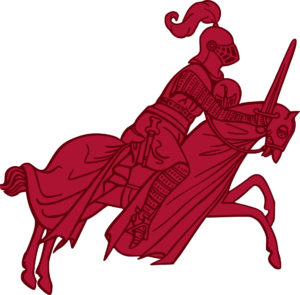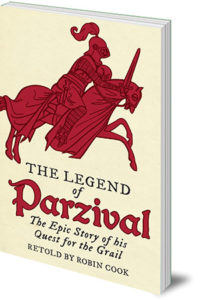The Legend of Parzival: The Epic Story of his Quest for the Grail
by Floris Books • 24 May 2018 • Books, Steiner-Waldorf Education • 0 Comments
In Steiner-Waldorf education, Parzival’s quest for the Grail can be seen as a metaphor for the difficult journey through life, which speaks strongly to adolescents and its study is at the heart of the Class 11 curriculum. As a hugely experienced Steiner-Waldorf teacher, Robin Cook’s engaging retelling, The Legend of Parzival, will provide valuable inspiration for other teachers and students, as well as enjoyment and enrichment for all readers.
Enter the extraordinary world of Arthurian legend in this extract from the book:
Little did Parzival realise that he was approaching the ultimate test of all his years of hardship and endurance. Ever since he had left Arthur’s court, after Cundrie la Sorciere had shamed him, he had learnt to accept whatever came to him. He had gradually developed calmness in the face of adversity as he became more and more sure that whatever he had to undertake, however difficult and demanding it was, all had its part to play in his search for the Grail. It was in this mood of acceptance that he entered the forest.
For some time, the way was easy enough. The sun shone, slanting through the delicate greens of beech and oak, and as he splashed through the shallow streams or skirted the deeper depressions, where the land had once collapsed under the workings of some underground watercourse, he felt a presentiment that something extraordinary was going to happen.
He was correct, for Destiny decreed he was about to encounter that which would determine the success or failure of his quest. Unknown to him, deep in the forest a mighty knight was making his way towards him: Feirefiz.
For many years Feirefiz had devoted himself and his deeds to love, and to Queen Secundille. For his queen he had extended her lands, conquered many knights and kingdoms, and accumulated fabulous wealth. Now he was in search of a final adventure, and had set out for the West, bringing with him twenty-five armies from the lands he had conquered. To name a few, there were Moors, Saracens, Scythians, Turks, Arabs and Mongolians. All spoke different languages and fought in different ways. Some of the armies consisted entirely of skilled horsemen, others had ranks of archers capable of raining down storms of arrows, and there were highly trained foot soldiers who fought shield to shield and were never known to break ranks. All these Feirefiz had left at the shore to await his return. He himself was accoutred with weapons and armour of staggering richness. His surcoat was of the finest silk, woven with threads of gold, and his shield was studded with turquoise, emeralds and rubies. On his helmet was that legendary beast the ecidemon, from whom no poisonous serpent ever escaped.
T hus it was that the two were drawn towards each other, and each caught sight of the other as they arrived simultaneously at the opposite ends of a broad clearing in the forest. Both reined in their horses, and there was no sound but the stamp of a hoof and a snort from Parzival’s charger as it shook its head, sensing the battle to come.
hus it was that the two were drawn towards each other, and each caught sight of the other as they arrived simultaneously at the opposite ends of a broad clearing in the forest. Both reined in their horses, and there was no sound but the stamp of a hoof and a snort from Parzival’s charger as it shook its head, sensing the battle to come.
The two knights circled the clearing, taking each other in. Parzival recognised all the trappings of a warrior from the Eastern lands. Feirefiz immediately took his opponent to be a Christian knight and was intrigued by his red armour. He had never fought a Christian knight before, and he relished the challenge.
With no word exchanged, only the salutation of raised spears, they prepared to charge. The two horses thudded across the forest floor and the two knights came together with a clap like thunder. A flock of starlings wheeled into the air and fled away. Both held their seat and wheeled and charged again, with the same result. The third time, both spears were shattered and flung aside, and they set about each other with swords. The horses began to sweat and quiver with the intensity of their exertion and then the men dismounted and set about each other on foot. It was the first time for both of them that they had encountered such fierce and skilled resistance. As they fought it out, gradually they found slight weaknesses to exploit, and first one and then the other had to give way a little. Sparks flew as they struck each other glancing blows, and both shields were severely battered. They began to grunt and pant with the effort, encouraging themselves with cries of “Tabronit!” from Feirefiz and “Belrepeire!” from Parzival.
Then Parzival found himself staggering under a fierce series of blows that brought him to his knees. He was only just able to recover and then it was Feirefiz’s turn to be forced back with such a flurry of blows as he had never encountered. At the height of the exchange, Parzival saw his opportunity and brought his sword down on his opponent’s helmet with a strength that would have felled any other man. Feirefiz staggered back, his head ringing, but the very force of the stroke caused the blade, the one Parzival had taken from Ither of Gaheviez, to snap. He leapt back, determined to fight on, but, to his surprise, his opponent stepped back too. He lowered his sword as he did so, and spoke.
“A fine blow! I see you will fight to the end, but it is no glory to me to fight so noble an opponent as yourself when your sword is broken. Come, let us catch our breath.”
Surprised and wary, but intrigued, Parzival lowered his shattered sword, and then, with a certain resignation, threw it to one side. Feirefiz, showing his honest intentions, threw his aside as well. They both sat down.
“I have never fought such a contest,” continued Feirefiz, raising his visor as he spoke. “What is your name? Mine is Feirefiz the Angevin.”
Parzival gazed in wonder at the mottled black and white skin, realising who he had been fighting. “The Angevin! I am from Anjou, and those castles and towns are mine. The only other person with a claim on them is the son of Gahmuret and Queen Belacane.”
They looked at each other intently.
“So you are…” began Feirefiz.
“Parzival. And you are my brother, Feirefiz.”
Discover the epic story of Parzival’s quest for the grail in a brand new retelling by Steiner-Waldorf teacher Robin Cook.
If you’re a Steiner-Waldorf teacher, check out our Steiner-Waldorf Teachers’ Hub for information on relevant books, downloadable resources and FAQs.


